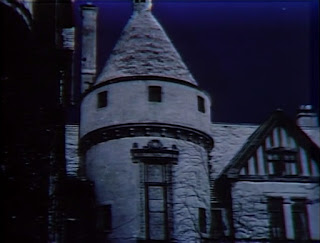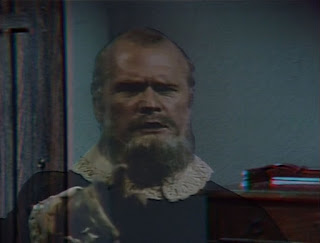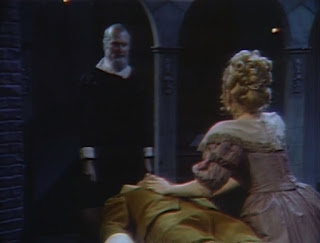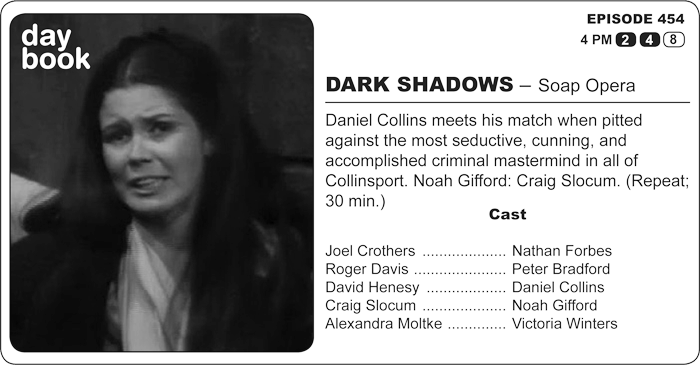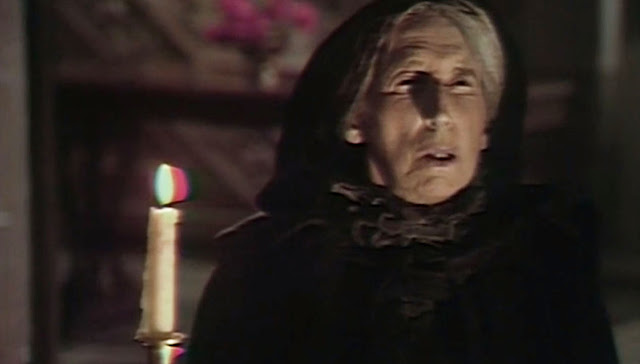
By PATRICK McCRAY
Taped on this date in 1968: Episode 450
In 1795, there is one force that can stop Angelique, and it just arrived at Collinwood. Bathia Mapes: Anita Bolster. (Repeat; 30 min.)
Bathia Mapes arrives to determine the nature of the curse and its solution. Meanwhile, Joshua deals with a mad Millicent and Barnabas is drawn back to the tower room. There, Mapes begins a battle with the force cursing Barnabas.
When we first learn about the supernatural as kids, it is the quintessence of the mysterious. We’ve spent a years of awareness learning the rules, and here is a system of action that breaks them. To what is it connected? What possibly explains it? When I first saw Dark Shadows, I was in a quiet awe of the vast mythology that explained how the house Got This Way. I was in equal awe of the cosmology that empowered those forces. Could it ever be explained? Of course not. And when you’re a kid, and everything is inexplicable, like magnets or the electoral college, this makes about as much sense as anything else.
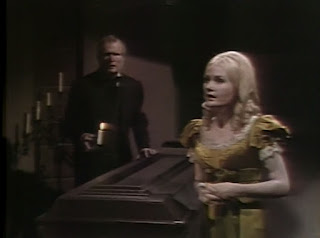 Then, the paranormal all loses its sense of wonder because we pretend to understand it to death. It becomes like religion, systems of reincarnation, or D&D. We either discover or make up all manner of elaborate, insert-tab-a-into-slot-b instruction manuals for how a paranormal universe works. This crystal cures this. This orc can be killed only by that. This star cluster absolutely means you’re gluten intolerant. And so on. It’s just as true for monster media. Vampires have about as much written about them as do dogs and cats. But in the name of celebrating our sources of wonder, we accidentally kill them with comprehension.
Then, the paranormal all loses its sense of wonder because we pretend to understand it to death. It becomes like religion, systems of reincarnation, or D&D. We either discover or make up all manner of elaborate, insert-tab-a-into-slot-b instruction manuals for how a paranormal universe works. This crystal cures this. This orc can be killed only by that. This star cluster absolutely means you’re gluten intolerant. And so on. It’s just as true for monster media. Vampires have about as much written about them as do dogs and cats. But in the name of celebrating our sources of wonder, we accidentally kill them with comprehension.Dark Shadows, perhaps due to hurried writing for a medium that no one’s going to see again, defies that. Yes, there’s a lot to understand and bicker about and make charts and graphs over. I do it a lot, myself. But at its best, the show is about the opposite. It makes all of us Victoria Winters out of confident Joshuas. We make fun of Vicki for not understanding, but that’s the point. She’s never meant to really understand what’s going on. We are never meant to understand what’s going on. Our job is not to understand what’s going on; it’s to connect through the experience of not being able to do so.
Bathia Mapes reminds us of that. Just when the show is at the outer end of strange, and Barnabas is summoning the voices of ghosts, and Joshua has lost all control of the Newtonian harness of causality, she shows up. The lighting is suddenly a dark and textured expression of the new dimension of Joshua’s world, plunging us into a Rembrandt painting. The dialogue has a sudden and Marlovian urgency and poetry. On a show accustomed to talking around problems, implicating with extreme prejudice, this episode speaks to the very heart of them. And yet, only one person knows what’s going on, a strange and confident sorcerer/precursor to Elise in INSIDIOUS.
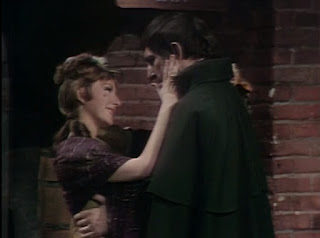 In a show where the supernatural frequently bullies the Collinses around, it takes a formidable person to give it what for. Even Stokes would concede that there are none like Bathia, looking and acting for all the world like the EC Cryptkeeper prior to death. She gives DS mythology new depth and familiar resonance by again treating a curse like a curse. On most of the show, the curse is considered the causal agent for the real problem, vampirism, and the only cure is a stake to the heart. Mapes treats the curse as the ongoing crisis, itself. She warns the Countess against being loved by him, and suddenly we get why Julia survives for as long as she does. Masks drop with thunderous noise. In no other timeline do we go from sacred denial to profane truth as in 1795, where the Enlightenment smolders down to to a muted hell over four and a half months. As the characters go mad from the truth, and Barnabas roars with the voice of Angelique, we finally get one character who knows what’s going on. It is the greatest testament to Angelique’s awesome ability that she doesn’t last long.
In a show where the supernatural frequently bullies the Collinses around, it takes a formidable person to give it what for. Even Stokes would concede that there are none like Bathia, looking and acting for all the world like the EC Cryptkeeper prior to death. She gives DS mythology new depth and familiar resonance by again treating a curse like a curse. On most of the show, the curse is considered the causal agent for the real problem, vampirism, and the only cure is a stake to the heart. Mapes treats the curse as the ongoing crisis, itself. She warns the Countess against being loved by him, and suddenly we get why Julia survives for as long as she does. Masks drop with thunderous noise. In no other timeline do we go from sacred denial to profane truth as in 1795, where the Enlightenment smolders down to to a muted hell over four and a half months. As the characters go mad from the truth, and Barnabas roars with the voice of Angelique, we finally get one character who knows what’s going on. It is the greatest testament to Angelique’s awesome ability that she doesn’t last long.But it’s jewelbox epic of a battle. These episodes won’t be matched for sheer pain until we learn of Quentin’s son’s death or the eventual death of Angelique. And even then, I’m not sure that this is a sustainable quality that the show can ever rival again.
This episode was broadcast March 15, 1968.


